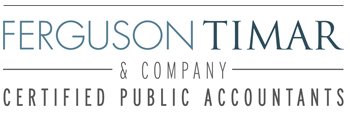
Whether you enlist the services of a professional accountant, benefit from streamlined approaches offered by many accountancy software programs, or do your books by hand, it’s important to think critically about the accounting method(s) you use on behalf of your business.
All too often, business owners blindly trust their accountant or software is approaching their finances in ways that are accurate, maximize the company’s potential, and will safeguard their company from liability. On the other end of the spectrum, some business owners take a minimalist approach to keeping their books that rejects thoughtful, creative analysis.
In this article, the savvy CPAs at Ferguson Timar discuss different accounting methods that could potentially benefit your small business if implemented in strategic ways. Even if you entrust your finances to a professional, learning about these methods can ensure your oversight of that professional’s work serves your company’s interests.
Primary Accounting Methods: Cash vs. Accrual Accounting
Unless your company’s books are an utter mess–or your company’s sales exceed roughly $25 million annually–chances are you either record expenses and income as they are billed and earned or as they are received and paid. The latter approach is known as cash accounting, and the former is referred to as accrual accounting.
Cash basis accounting is straightforward: Income is recorded once it’s received, and expenses are recorded as they’re paid. No explicit consideration is given to future expected income or expenses with this method. Instead, income is recorded once it’s in the company’s coffers, and expenses are recorded once the income used to pay those expenses leaves them.
By contrast, income and expenses are recorded when they are earned and billed via the accrual approach, even if the money in question has not yet been received or paid out. For example, if your company signs a contract to pay a vendor $20,000 in June, but the account isn’t payable until the vendor’s work is completed in August, you’d track the expense in your June accounting using the accrual approach and in your August accounting using the cash basis approach.
Similarly, if your company earned a commission in September but didn’t receive that payout until December, that windfall would be recorded in September as income if using the accrual method and in December if using the cash basis method.
Should Your Company Use One or the Other?
There are benefits and drawbacks to embracing either approach. The cash basis method is straightforward and less primed to inspire human error. Money is recorded as it goes in and out. It’s difficult to misinterpret numbers when they’re only accounted for when a monetary transaction unfolds, as opposed to when there is anticipation that one will. This method also acts as a form of insurance in the sense that a business isn’t counting on money that may never materialize should a customer fail to pay their balance, a natural disaster render a distributor unable to perform their obligations per the terms of a contract, etc.
Yet, limitations to the cash basis approach cannot be underestimated because of its short-term focus. Say a business needs to make a significant purchase, and the bill for that purchase is not due for months. By failing to account for that expense within the company’s records immediately, its income may appear inflated. As a result, business decisions could be made without the looming large payment due in mind because it appears there is more income available to spend than there really is.
Conversely, accrual accounting can be so focused on long-term numbers that it can leave business owners in a lurch if they aren’t watching their accounts in real time. Say a company expects a large payout in three months. Their books then say they are in the black, even if they are currently overdrawn because several bills became due, and that large payout is still pending.
Overall, cash basis accounting provides a clear short-term view of a company’s finances, whereas accrual accounting is a more scalable approach that provides a longer-term view of obligations owed and income earned. As a broad rule of thumb, smaller and less complex businesses tend to benefit from cash basis accounting, and larger, more complex operations tend to do better with the accrual method. However, businesses of any size are generally in the strongest possible position when they work with professionals who understand how to analyze both short-term and long-term financial realities to support immediate business needs and broader financial goals alike.
Attain the Most Out of Your Business Accounting with Ferguson Timar
The CPAs at Ferguson Timar are passionate about guiding individuals and business owners to reach their financial goals as efficiently and effectively as possible. If you want to move on from “keeping the books” to an approach to accounting that makes the most of what your business has to offer, consider engaging the assistance of our firm’s skilled CPAs. Connect with the team today by calling (714) 204-0100 to learn more. We look forward to hearing from you.
